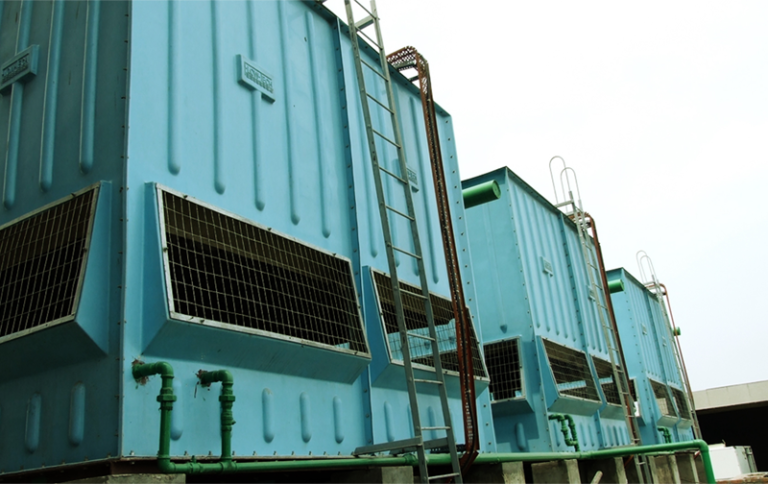Introduction
Cooling Towers Food Processing industry by helping to regulate the heat generated from various production processes. From refrigeration to pasteurization, these systems maintain the optimal temperature necessary for both food safety and production efficiency. However, due to the sensitive nature of food products, special considerations must be given to the design, maintenance, and operation of cooling towers in food processing environments. Hygiene, water quality, and regulatory compliance are among the most critical factors that ensure the safety and effectiveness of these systems. This article explores the unique considerations and best practices for cooling tower use in food processing, helping companies maintain high standards in their cooling systems while ensuring product quality and safety.
Special Considerations for Cooling Towers in Food Processing
Hygiene and Sanitation:
- Critical for Food Safety: Cooling towers in food processing facilities need to be kept clean and sanitized regularly to prevent contamination. The presence of bacteria, algae, and other microorganisms in the water can pose serious health risks, including the spread of Legionella, a bacteria that causes Legionnaires’ disease. Strict sanitation protocols must be followed, including using non-toxic biocides, regular water treatment, and filtration systems.
Water Quality:
- Importance of Clean Water: Water used in cooling towers must meet high standards of purity to prevent scaling, corrosion, and fouling. The food processing industry often deals with water that is in contact with food products, so the water should not only be free from contaminants but also be safe for indirect contact with food surfaces. Regular water testing and treatment are essential to maintain water quality.
Temperature Control:
- Precise Temperature Management: Maintaining the correct temperature is critical for the efficiency of food processing operations. Cooling towers must be designed to effectively manage heat loads from various machines and processes, ensuring that the cooling system can maintain optimal temperatures without impacting the quality of the food product.
Regulatory Compliance:
- Meeting Industry Standards: Cooling towers in food processing must comply with stringent food safety and environmental regulations. This includes ensuring that all materials used are food-grade, that the cooling water does not leak into food production areas, and that cooling tower systems adhere to guidelines set by agencies such as the FDA or USDA.
Energy Efficiency:
- Reducing Operational Costs: In food processing, where large amounts of heat must be dissipated, cooling towers can account for a significant portion of energy consumption. Energy-efficient cooling tower systems, such as variable speed fans and advanced heat exchangers, should be utilized to reduce energy costs and minimize the environmental impact of operations.
Best Practices for Cooling Towers in Food Processing
Regular Cleaning and Maintenance:
- Cooling towers in food processing should undergo frequent cleaning to avoid biofilm buildup, algae growth, and mineral scaling. Scheduled inspections of all components, including fans, pumps, and water distribution systems, are necessary to maintain the efficiency and hygiene of the system.
Use of Closed-Loop Systems:
- Implementing closed-loop cooling systems instead of open-loop systems can improve water quality, reduce the risk of contamination, and minimize the amount of water lost through evaporation. These systems circulate water in a sealed loop, which limits exposure to contaminants.
Effective Filtration Systems:
- To ensure water quality, high-performance filtration systems should be in place to trap debris, prevent clogging, and improve the efficiency of the cooling tower. Filters should be checked and replaced regularly to ensure optimal performance.
Use of Non-Toxic Chemicals:
- In food processing, non-toxic water treatment chemicals should be used to prevent algae growth, scale formation, and corrosion. Biocides and other chemicals must meet food safety standards and be safe for use in environments where food is processed.
Monitor Water and Airflow:
- Regular monitoring of both the water and airflow in cooling towers is vital. Sensors should be installed to track water temperature, flow rates, and chemical levels, ensuring that the cooling tower is operating efficiently and that any anomalies are promptly addressed.
Adopt Water Conservation Practices:
- Food processing facilities should implement water-saving technologies such as water recovery systems, which recycle water for non-food-related applications, to reduce water consumption and environmental impact.
Ensure Adequate Cooling Capacity:
- Properly sizing the cooling tower is essential to handle the heat load generated by the food processing operation. An undersized system can lead to inefficiency, while an oversized one may be wasteful and more costly. Accurate load analysis is crucial for selecting the right system.
Conclusion
In conclusion, cooling towers are indispensable in the food processing industry, ensuring that heat generated during production is efficiently managed without compromising the quality or safety of food products. By focusing on essential aspects like regular maintenance, water treatment, and adherence to safety regulations, food processors can optimize the performance of their cooling systems. Implementing best practices such as closed-loop systems, energy-efficient technologies, and non-toxic chemicals not only enhances the efficiency of the cooling towers but also helps to reduce environmental impacts.

